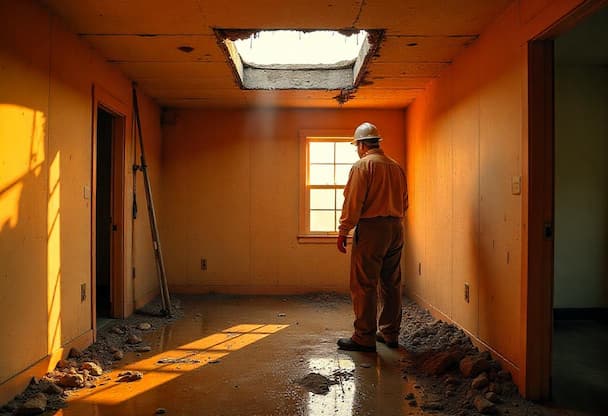Choosing a restoration contractor in the aftermath of a hurricane can be overwhelming. It’s always hard to see your property damaged after something out of your control, and knowing that time is essential to salvage as much as possible only adds more stress to your situation. If you wish to hire a professional and qualified company that can help you build your life back, looking for licensed contractors is the first step.
Licensed contractors are registered and/or certified by the state, ensuring they have the experience, safety standards, and qualifications necessary to perform building and restoration work. Thus, you increase the chances of receiving a high-quality job worth your investment.
Licensing is so vital in Florida that, according to the Department of Business and Professional Regulations, unlicensed work during a declared state of emergency is considered a third-degree felony, facing up to five years of jail time or probation and civil penalties up to $10,000.
However, ensuring your contractor is licensed is the first step to guaranteeing a successful restoration. To guarantee you’re making the right choice, and your company won’t cause you headaches due to unclear work, surprising fees, or poor communication, you should ask them these essential questions before signing a contract.
11 questions to choose reliable, licensed contractors for a hurricane restoration.
1. Does your crew have any certifications?
Besides being licensed, you should ensure all persons working on your property have the necessary certifications to perform the activities needed, whether construction, disaster clean-up, or plumbing.
2. How many permits have you obtained in this jurisdiction in the past two years?
Since certified licensed contractors can perform restoration work statewide, finding companies based outside your city is not unusual. Hence, proving they are familiar with your local building codes and have worked with your jurisdiction shows their local expertise in tackling your hurricane restoration project, whether in Stuart or Okeechobee.
3. Have you done other property repairs and rebuilds after a natural disaster like this?
Asking licensed contractors about their experience with hurricane damage guarantees they have the knowledge to help you rebuild your property, complying with local codes and requirements to ensure it lasts through time, and you won’t be dealing with poorly done work and later repairs.
4. Can I get proof of your general liability and workers’ compensation insurance?
Working with a fully insured company is an extra protection for your peace of mind. Although reliable contractors do their best to avoid incidents and comply with the industry safety standards, nobody is exempt from an accident. Hence, if your company has this insurance, you can be confident it’ll cover any accidental damage to your property during work or any injury compensation to a worker.
When looking for licensed contractors, ask them for a copy of their insurance certification and ensure it’s current and valid. However, the Federal Emergency Management Agency (FEMA) notes that if the general contractor has no employees, they may not need workers’ compensation insurance.
5. Will you hire subcontractors for this project?
If you’re working with a single-member company or the chosen contractor doesn’t have personnel to take on any given part of the project, like disaster cleanup, they’ll likely hire another company to do the job.
If this is the case, ask them for the subcontractors’ names and the type of work they’ll perform. This way, you can verify they have their credentials and local expertise and ensure they won’t pose a threat to your property and safety.
6. Do you provide any written warranties?
Reputable licensed contractors should stand behind their work and provide you with a written warranty agreement that clearly outlines what’s covered, under what conditions, and for how long. Likewise, some contractors will offer warranties over the quality materials used for extra peace of mind; however, ensure this is noted in your agreement.
7. Can I get a list of your past clients?
Any credible contractor should be able to provide you with references and recommendations from past clients. References are essential because they let you know your potential contractor’s quality of work and customer service and prove their claimed experience.
Likewise, it can ensure they offer particular services or approaches you need, such as sustainable practices.
FEMA recommends you contact between 3 and 5 past customers when choosing licensed contractors and suggest the following questions for them:
- Will you be satisfied with the results?
- Did they complete the project according to your budget and on time? If not, what issues affected your overall costs?
- Would you hire them again? If not, why wouldn’t you?
8. What is the expected project timeline?
The project deadlines will vary depending on the extent of the damage. However, having a clear, detailed timeline will help you reduce anxiety and stay resilient during the restoration project.
9. How will you supervise the project?
Most restoration projects involve extensive reconstruction work, which can last several days or months. Hence, licensed contractors must assign someone to oversee the project on the job site from start to finish to ensure it is completed as intended.
Your project manager should have previous experience with hurricane damage and be familiar with your project specifications to ensure it is done correctly and complies with local building codes. Likewise, you should have a direct communication line with them to resolve your questions and any issues that may arise during the work, and to update you about your property restoration.
10. How will I pay for the project?
It’s a common practice for contractors to require a down payment for a contract. However, you shouldn’t pay any licensed contractors in full before the project starts.
If the project is expected to take several months, ensure that the payment schedule is determined and outlined within the contract before signing and that you feel comfortable with the payment approach (for milestones, on-set deadlines, etc.). Also, make the payments traceably through bank transfer, checks, or cards, or ensure you receive a cash payment receipt.
11. Who will coordinate the permit obtention and required inspections?
Defining who is responsible for these stated-mandated requirements is essential to guarantee that your project timeline isn’t delayed. Otherwise, you may assume your contractor will do it, only to find months later that the permits were never obtained.
Although there is some additional cost, it’s recommended that licensed contractors handle the permitting process to relieve some of the burden and ensure the company has the qualifications and licensing required for the job.
Also, it’s recommended that the contractor coordinate the building permit inspections that some counties demand to guarantee compliance with the building codes and safety standards. You should be present during these inspections to ensure they occur, and be aware of the feedback and any correction notices issued by your local building department.
Get TRM’s commitment to excellence in every restoration project
We’ve been serving South Florida since 1991 with a relentless commitment to quality, safety standards, and professionalism in all our construction services.
Being a general contractor and a construction management company gives your project a unique approach you’d hardly find with any other licensed contractors. We won’t only help you rebuild or repair your property after a hurricane; we can also handle the entire project for you, contacting and hiring subcontractors, supervising workers, and ensuring everything on-site goes smoothly.
Our service area includes the entire Treasure Coast and Palm Beaches:
Saint Lucy County: Port St Lucie and beyond.
Martin County: Vero Beach, Stuart, Jupiter, Fort Pierce, Jensen Beach, Hobe Sound, and Palm City.
Indian River County
Okeechobee County: Okeechobee
Palm Beach County: Palm Beach
So no matter where you are, contact us today!



